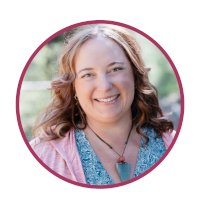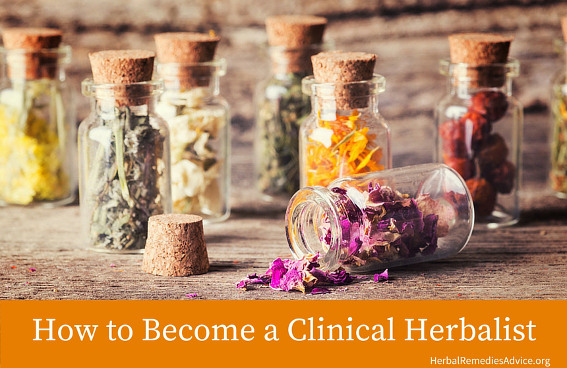Get weekly tips, recipes, and my Herbal Jumpstart e-course! Sign up for free today.

How to Become a Licensed or Clinical Herbalist?
Share this! |
|
Several times a week I am contacted by people who want to know how to become a clinical herbalist so they can work one-on-one with folks who have health challenges. Most people also mention they are seeking to be certified or licensed.
After typing numerous responses to individuals, I’ve decided to hit all the major questions in this article.
About Licensing and Certification
There is no certificate or license available to western herbalists. The closest thing would be to become an acupuncturist (usually a 4 year post college degree) and also become licensed for herbs.
You can be designated as a Professional Herbalist by the American Herbalist Guild. In order to do this you must meet a set of guidelines and then go through an application process that involves a peer review. This is not a certification and it does not grant any legal rights. Click here to read more about the process of applying to be a professional herbalist with the American Herbalist Guild.
It is legal to be an herbalist! However, it’s imperative that herbalists be vigilant about staying within their bounds and avoid doing anything that resembles practicing medicine. Diagnosing, prescribing or claiming to cure western diseases are all acts that could be construed as practicing medicine without a license, which is against the law. For more information about the legalities of being an herbalist read this article.
Another important thing worth mentioning is that the term “master herbalist” does not mean anything. Various schools give this title to their graduates; however, some of those schools require weekend classes while other schools require several years of training. Many grassroots herbalists disdain that title as it is both meaningless and pretentious. I have no doubt there are some wonderful herbalists out there using this title, but simply using that title does not mean that person is a “master” herbalist. Seeking out a school for the specific purpose of being designated a master herbalist is misguided and does not ensure you will receive a good education.
How Did I Become a Clinical Herbalist?
People also often ask me what the one clear path to becoming a clinical herbalist is. What school should they attend? What steps do they take?
This is a tricky question for me since I went to multiple schools and have probably spent an equal amount of time learning on my own. I value and respect all the schools that I attended. I learned dramatically different things at each school and I can’t imagine my practice as an herbalist without any of them. For that reason I can’t honestly say that there is ONE school that I would recommend.
Instead, I recommend reflecting on what it is you want to know. Some people only want to learn about herbs that grow in their bioregion. Some people want to study the herbal theories of Ayurveda or Chinese Medicine. Some people want to have a more science-based background. While I consider myself to be an herbalist, most of my continuing education training for the past several years has been Functional Medicine based rather than herbalist based. So many options!
Click here to see my article on choosing your herbal school.
If you know that you specifically want to be an herbalist who works with people who have health issues, then look for a school that provides that type of training.
There are many schools out there that teach you how to grow, wildcraft and identify plants. I am so thankful that I started my own studies learning these skills. However, these skills have very little to do with being a clinical herbalist. Let me clarify that. You can certainly be a wildcrafting, medicinal herb farmer who also works with people. However, you can be a fantastic clinical herbalist without knowing anything about those skills. You will struggle to be a clinical herbalist, however, if you only know wildcrafting and know nothing about formulation, diagnostics, creating a herbal plan, running a practice, etc. Again, it comes down to what you want to know.
The American Herbalist Guild has a list of recommendations on what to study to be qualified as a clinical herbalist. I think these recommendations mostly offer a good general idea of important areas of study:
- Botany and Plant Identification (60 hrs)
- Materia Medica/Therapeutic Herbalism (400 hrs)
- Pharmacy, Pharmacognosy and Dispensing (80 hrs)
- Clinical Skills (400 hrs)
- Career Preparation/Practice Development/Ethics (20 hrs)*
- History & Philosophy/Introduction to Research (40 hrs)
*The one major difference I would offer with this list is that I think someone will need a lot more hours in business/marketing, which brings me to my last point…
How Will You Get a Job as a Clinical Herbalist?
There are very few jobs available as a clinical herbalist. Instead, most people on this path become entrepreneurs, meaning they start and run their own business.
I’ve heard countless times that it is impossible to make a living as an herbalist. I know from personal experience that making a living as an herbalist isn’t easy. There are no easy pathways and there are a variety of challenges along the way. However, I also believe that it is possible to make a living as an herbalist. I do!
However, this is a big issue to ponder. Do you want to make your living as a clinical herbalist? Do you want to run your own business and be self-employed? Do you want to become an entrepreneur?
My current recipe for success for herbalists is to spend at least six months, or easily a year, learning how to start and run a successful business. One to two classes within your herbal training is not going to cut it.
Finding Your Herbal School
At this point I am tempted to give a list of herbal schools that offer clinical training but I ultimately find that problematic. I have not attended every clinically-oriented school out there. As a result, my list of schools would be short and would undoubtedly leave out many wonderful schools.
Instead I’ll leave you with links to other sites that list schools. Keep in mind that I am not endorsing all the schools listed within these sites, but offer them as a way for you to do your own research.
These lists include both long distance and in-person trainings:
You may ultimately find, as I did, that you will need to attend multiple schools in order to get the herbal education you desire. For example, I learned Chinese and Ayurveda diagnostics at one school, but I had to go to another school to learn about nutrition and diet.
We live in an age of information and it’s easy to be overwhelmed. However, in my opinion, the best herbalists out there are the ones who never stop learning. My advice is to take that first step and then keep putting one foot in front of the other.
Want to Hear Even More Advice?
See my article, 3 Tips for Overcoming Your Fears, Gaining Confidence & Becoming a Successful Herbalist.

Rosalee is an herbalist and author of the bestselling book Alchemy of Herbs: Transform Everyday Ingredients Into Foods & Remedies That Healand co-author of the bestselling book Wild Remedies: How to Forage Healing Foods and Craft Your Own Herbal Medicine. She's a registered herbalist with the American Herbalist Guild and has taught thousands of students through her online courses. Read about how Rosalee went from having a terminal illness to being a bestselling author in her full story here.
